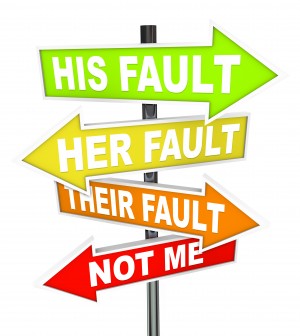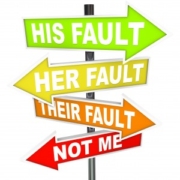Who’s to blame?

“These are the words that Moshe addressed to all Israel on the other side of the Jordan…” (Deuteronomy 1:1)
The book of Deuteronomy is in large part a retelling of everything that happened during the forty years of wandering in the wilderness. It’s Moshe’s farewell speech. Before they cross the river into the Land of Promise, he reminds them where they’ve been and what they’ve done.
And notably, in Moshe’s retelling, everything becomes the Israelites’ fault. Even God’s decision that Moshe will not enter the Land of Promise. Remember that the first time we read that story, God said that because Moshe struck the rock instead of speaking to it gently, he would not enter the Land. God didn’t say anything about blaming it on the children of Israel — but that’s how Moshe retells it.
Now, we could have a whole conversation about what the striking-the-rock thing means, and whether it’s fair, and how we understand it. But what really jumps out at me this year is how, in the retelling, Moshe blames his situation on the Israelites for being quarrelsome and for having insufficient faith in God. He places all the blame on someone else.
This Shabbat — the one right before Tisha b’Av, our communal day of mourning — is called Shabbat Hazon, the Shabbat of Vision. It invites us to turn our vision inward. To notice how we retell the stories of our lives, and where we elide responsibility. It’s a very human thing to do. It’s normal. Even Moshe does it, in this week’s parsha. And… it’s a pattern we need to break.
Where do we fall into the trap of blaming others? Do we look at our body politic and blame those who voted for the “other side,” or those who didn’t vote at all? Or closer to home: where our family systems might have some dysfunction, do we blame it on the other members of the family without looking at how our own actions contribute to recurring patterns?
That’s normal. It’s human. And I believe that authentic spiritual life asks us to do better. It asks us to take responsibility.
Rabbi Alan Lew z”l teaches that the journey of teshuvah — of repentance and return — begins with the low point of Tisha b’Av. Then the updraft of this spiritual work carries us through the Days of Awe and into who we’ll be in the year to come. He teaches that every year the seasonal calendar calls us to face our unconscious patterns and the recurring issue in our lives.
On Tisha b’Av we remember the fall of the Temples. Rabbi Lew points out that in a historical sense, the Temples fell because of massive military might — first Babylon, then Rome. But our spiritual tradition ignores that.
Our spiritual tradition teaches that the first Temple fell because of idolatry, sexual immorality (which I understand as unethical boundary-crossing), and bloodshed, and the second Temple fell because of sinat chinam, baseless hatred. These teachings ask us to take responsibility for our part in what happens to us. It asks us to take responsibility for what happens to our community.
I have a lot of empathy for Moses. He’s been leading the children of Israel through the wilderness for forty years, and they’ve often been ungrateful and quarrelsome and afraid. I have empathy… and I wonder what would have happened if he’d retold their story in a way that recognized the community’s struggles and took responsibility for his part in their imperfect situation. If instead of saying, “I don’t take responsibility at all,” he’d emphasized that we’re all responsible for how our community functions, how might Torah’s story have been different?
And what happens if we tell our story that way? If we tell the story of our community — our shul, our county, our nation, our world — with the assumption that we all take responsibility? Rabbi Abraham Joshua Heschel z”l taught that “one must feel for the suffering of human beings, that indifference to evil is worse than evil itself, that in a free society, some are guilty, but all are responsible.”
May this Shabbat Hazon move us to see our responsibility for each other, and with that vision, to build a better world.
This is the d’varling Rabbi Rachel offered at Zoom Kabbalat Shabbat services (cross-posted to Velveteen Rabbi.)





